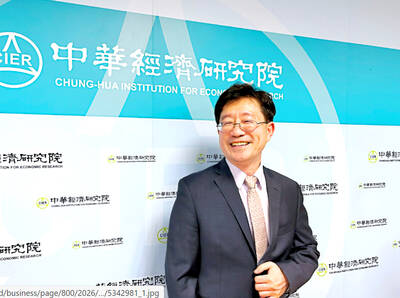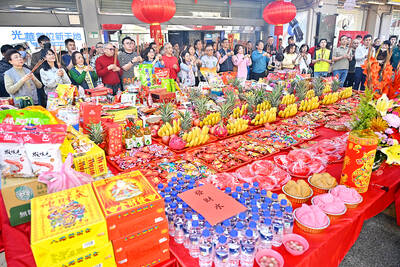The Taiwan Agricultural Academia-Industry Alliance (Taiwan 3A, 台灣農業產學聯盟) is getting ready to help solve China's agricultural problems through a joint program organized by several Taiwanese agricultural experts and a financial institution in Macau.
Wu Ming-ming (
The idea of getting Taiwanese experts to help China deal with its agricultural problems was proposed by the Macau branch of Delta Asia Financial Group, which took the initiative to get in touch with the council, Wu said.
"Council officials told us that the Macau financial institution would like to invest HK$500 million [US$64.2 million] in an agricultural development fund to help poor areas in China, and that it wanted us to provide the agricultural expertise and personnel," Wu said.
"We accepted the council's suggestion to participate as we considered it a meaningful job," he said.
" Not only will it relieve poverty in China, we also hope it can create a win-win situation in terms of cross-strait cooperation," he said.
The program was initially drawn up by Taiwan 3A and Stanley Au (
They chose Beihai in Guangxi Province, Meixian in Guangdong and Kunming in Yunnan for the pilot projects, Wu said.
While the exact details of the program will not be ironed out until Au's next visit to Taiwan in September, Wu said it will focus on three areas.
China has long been plagued by three agriculture-related problems -- agriculture, farmers and rural villages," he said.
"Based on Taiwan's agricultural development experience, I thought that Taiwan's agricultural experts could find some way to solve these problems," he said.
The first goal of the program will be to improve the low productivity of China's villages, enabling farmers to produce enough food to sustain their families, he said.
The second goal is to ensure food safety by teaching farmers about the proper use of pesticides and other chemicals that they use, he said.
The third goal will be to teach farmers to protect their environment and ecological resources, Wu said.

The Grand Hotel Taipei on Saturday confirmed that its information system had been illegally accessed and expressed its deepest apologies for the concern it has caused its customers, adding that the issue is being investigated by the Ministry of Justice Investigation Bureau. The hotel said that on Tuesday last week, it had discovered an external illegal intrusion into its information system. An initial digital forensic investigation confirmed that parts of the system had been accessed, it said, adding that the possibility that some customer data were stolen and leaked could not be ruled out. The actual scope and content of the affected data

DO THEY BITE IT? Cats have better memories than people might think, but their motivation is based entirely around the chance of getting fed Cats can remember the identity of the people who fed them the day before, Taipei-based veterinarians said on Friday, debunking a popular myth that cats have a short memory. If a stray does not recognize the person who fed them the previous day, it is likely because they are not carrying food and the cat has no reason to recognize them, said Wu Chou Animal Hospital head Chen Chen-huan (陳震寰). “When cats come to a human bearing food, it is coming for the food, not the person,” he said. “The food is the key.” Since the cat’s attention is on the food, it

Taiwan must act to preempt potential Section 301 investigations as US President Donald Trump moves to a new tariff strategy, following a US Supreme Court ruling that voided tariff measures, an academic said yesterday. Countries running the largest trade surpluses with the US face a growing likelihood of Section 301 investigations, Chung-Hua Institution for Economic Research president Lien Hsien-ming (連賢明) said. Section 301 refers to a provision of the Trade Act of 1974 that allows Washington to impose retaliatory tariffs over perceived unfair trade practices, including the running of large trade surpluses. Because Taiwan has become the fourth-largest source of the US’ trade

People hold incense and pray with offerings in front of Taipei’s Kuanghwa Market yesterday. The fifth day of the Lunar New Year is traditionally about welcoming the God of Wealth, during which companies and shops set off firecrackers to celebrate their reopening and pray for good business in the new year.